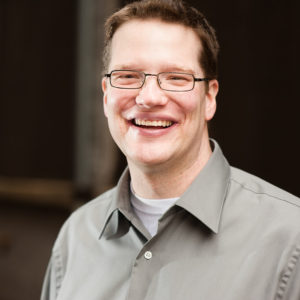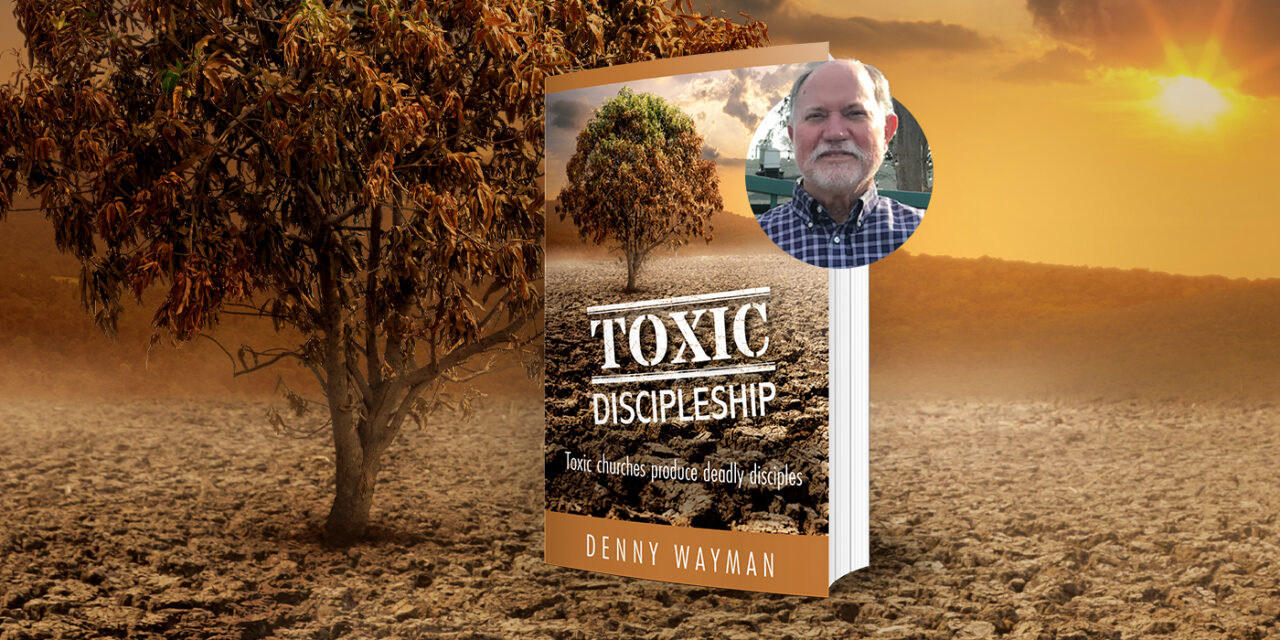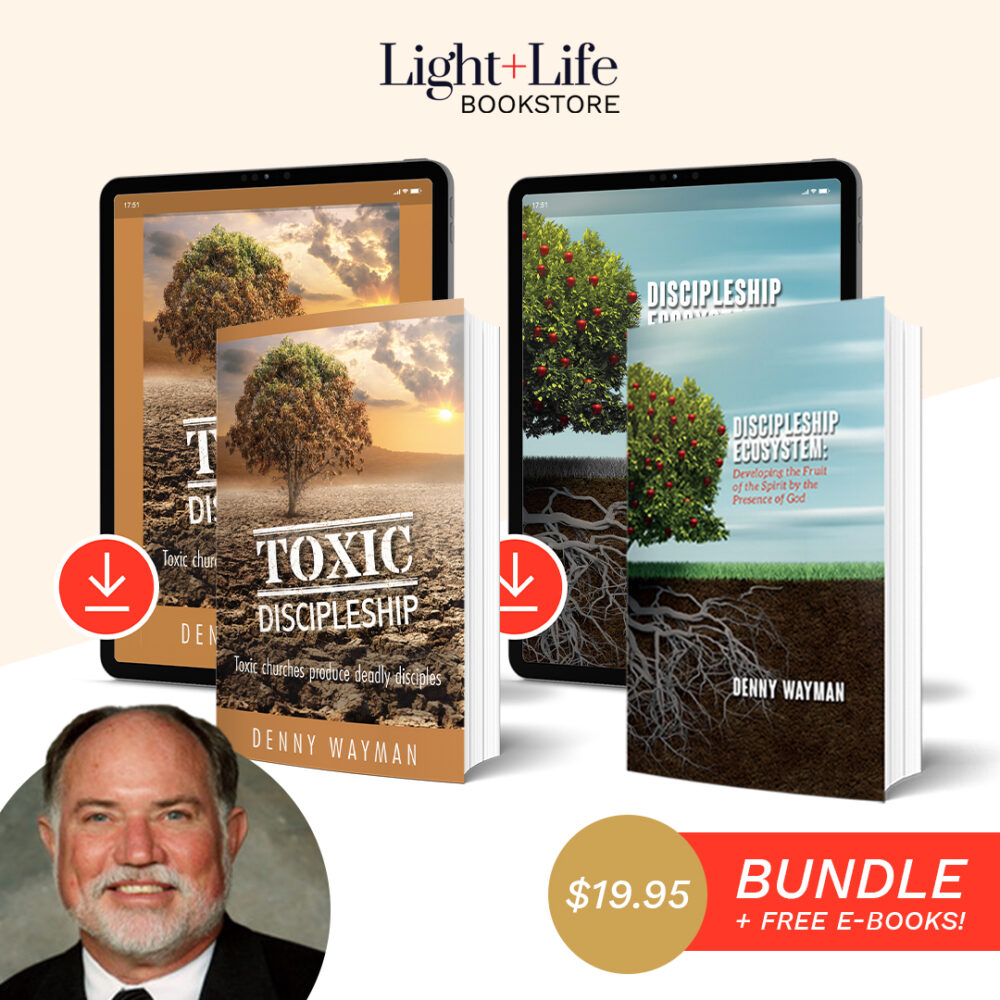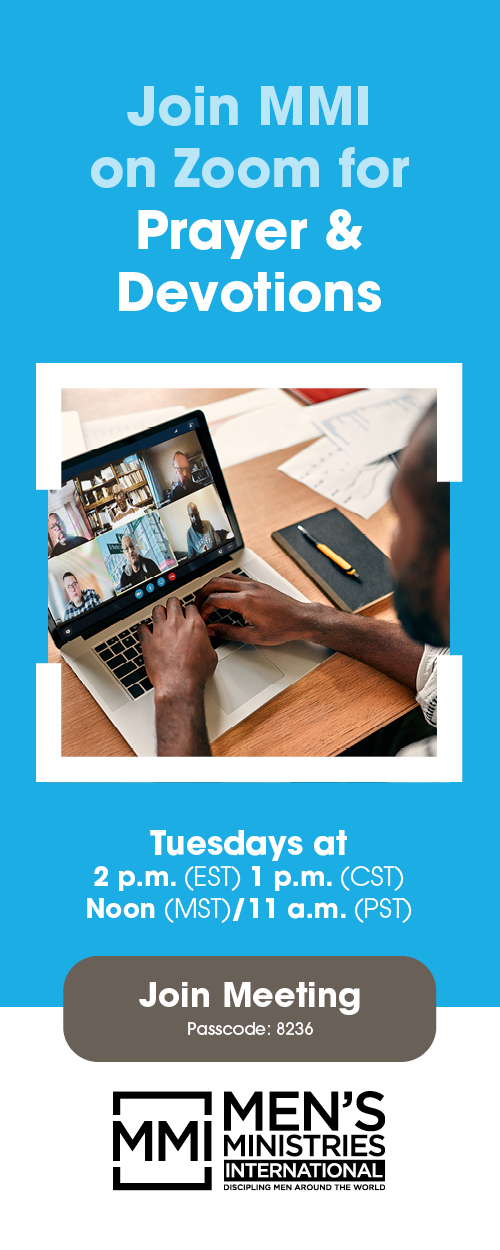A Light+Life Podcast
Toxic Discipleship in the Church – Denny Wayman
Hosted by Brett Heintzman

Jeff Finley
Light + Life Executive Editor
Jeff Finley is this magazine’s executive editor. He joined the Light+Life team in 2011 after a dozen years of reporting and editing for Sun-Times Media. He is a member of John Wesley Free Methodist Church where his wife, Jen, serves as the lead pastor.
by Jeff Finley
Many books have been written to help people identify, handle or avoid “toxic people” in their lives, but what happens when toxicity infects the church?
In his new book “Toxic Discipleship: Toxic Churches Produce Deadly Disciples,” Denny Wayman explores this subject while drawing upon four decades of pastoral ministry (including eight years as superintendent of the Free Methodist Church in Southern California) and counseling experience with extensive study of Scripture and psychology.
“When we are rooted in toxic families, toxic communities, toxic culture, and we come into the church, we want to put our roots now into the very presence of God. It’s in the presence of God that the fruit of the Spirit grow,” Wayman said during an interview with Brett Heintzman on a new episode of “The Light + Life Podcast.” “But the problem is we bring our own roots into the church, and the roots have these patterns of being and doing and relating to others in such a way that they’re toxic.”
Wayman said any group of people “has a way of being that is either helpful or destructive or a combination,” and “most churches have some toxic elements.”
Some people think they can escape toxicity by changing churches.
“The problem is we bring our roots with all of their toxicity into the new church, and then it doesn’t feel like home until it smells like and feels like the toxic environment that we know,” he said.
Wayman’s Master of Divinity degree concentrated on human behavior, and his Doctor of Ministry degree focused on pastoral counseling. His wife, Cheryl, is a licensed marriage and family therapist. His studies and experiences led to his new book particularly warning against worship of self, selfish ambition and willful ignorance.
“Together they are this toxic cocktail that is just so destructive,” Wayman said. “In my first book [Discipleship Ecosystem], I talked about worship, prayer and study being the three primary spiritual practices, which grow the fruit of the Spirit. I would say that these three dangers — worship of self, selfish ambition and willful ignorance — are the triad against our well-being and the well-being of our church, family and community.”
Deadly Sins
“Discipleship Ecosystem” focuses on the fruit of the Spirit, and “Toxic Discipleship” contrasts the fruit of the Spirit with the seven deadly sins. The new book is designed to help pastors, leaders and church members recognize the dangers of each sin and protect themselves.
“In each of the chapters, I go into how does a deadly sin interact with the different gifts of the Spirit and how we use them,” he said. “Every toxic nutrient that goes into creating the deadly sins will impact, in a negative way, the use of the gifts of the Spirit, which will then multiply the deadly toxicity in the soil of the church.”
_
“What is it that leads to death? What are deadly sins, and how do those sins manifest themselves?”
_
The Bible states that some sins lead to death while others do not. According to 1 John 5:16–17, “If you see any brother or sister commit a sin that does not lead to death, you should pray and God will give them life. I refer to those whose sin does not lead to death. There is a sin that leads to death. I am not saying that you should pray about that. All wrongdoing is sin, and there is sin that does not lead to death.”
Wayman said that, for more than 2,000 years, the church has tried to figure out: “What is it that leads to death? What are deadly sins, and how do those sins manifest themselves?”
Some church leaders have disagreed over the years about the number of deadly sins and which sins are deadly. Wayman said he “decided to stick with the classic seven deadly [pride, greed, wrath, envy, lust, gluttony and sloth] just like I stayed with the 12 classic spiritual disciplines in the first book. These are things that are proven by the church over hundreds of years to be deadly.”
Wayman acknowledged that he didn’t fully realize the severe consequences of some of the sins — particularly gluttony and sloth — “until I truly researched the biblical support for how deadly those are.”
The Wrong Ambition
In their podcast conversation, Heintzman and Wayman discussed the connection between pride and worship of self.
“Prideful worship of self in a leader would cause a leader to expect everyone in the congregation to honor them in such a way as you don’t raise questions,” said Wayman, who added that prideful leaders suggest “they have a direct line to God; they don’t need the laity in their board work because they know what God wants. And when you have that kind of toxic leadership effect, then everything about the church becomes a selfish ambition rather than an ambition for God.”
_
“Our source for truth is the Bible.”
_
Wayman said the prideful pastor’s church members do things “because the pastor wants us to do it, or the pastor demands it.” If the church is large enough to have multiple staff members, then the prideful pastor dominates the staff, but that behavior contradicts the teachings and behavior of Jesus.
“If this is Jesus’s church, then why would we as pastors want to dominate anyone? We want to be a servant of all, as Jesus says. That’s what would produce the mature disciple,” he said.
Heintzman noted that the “Toxic Discipleship” book examines each deadly sin from the root of the original Greek words. Wayman explained that this practice emerged from the primary emphasis on Scripture in the Wesleyan quadrilateral.
“Our source for truth is the Bible. We need to start with what does the Bible say about this. Church tradition has taught us a lot — so has the social sciences, so does our own personal experience — but when you start with the Bible, you need to go back and start with the words that they actually used,” Wayman said.
Pastors and church members need to work together to identify deadly sins and work to remove them rather than basing our behavior on what is acceptable in our modern culture.
“There’s a great pressure on the church today to look like the world,” Wayman said.
Wayman was inspired to write “Toxic Discipleship” because of a Zoom meeting about “Discipleship Ecosystem” with a Harvard University/Boston area discipleship group led by Free Methodists Ethan and Maria Goodnight. Two therapists in the group questioned Wayman about why he didn’t go into more detail when he referenced toxic soil affecting fruit.
“God just grabbed my imagination, my attention. I had to do a lot of study,” said Wayman, who noted that he based “Discipleship Ecosystem” on years of what he taught as a pastor. He took a different approach for “Toxic Discipleship,” which he wrote while immersing himself in theological and psychological literature.
The two books can be purchased together at the Light + Life Bookstore for $19.95 in a bundle that includes the books’ print and electronic editions. “Toxic Discipleship” is available individually for $15.95 in print or as an e-book.

Jeff Finley
Light + Life Executive Editor
Jeff Finley is this magazine’s executive editor. He joined the Light+Life team in 2011 after a dozen years of reporting and editing for Sun-Times Media. He is a member of John Wesley Free Methodist Church where his wife, Jen, serves as the lead pastor.










